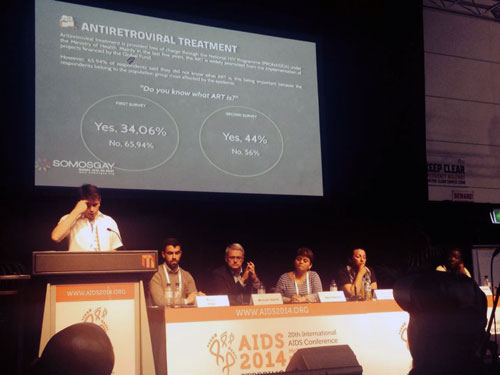Posted by Ben Clapham, August 4, 2014

Simon Cazal, executive director of SOMOSGAY, a GMT Initiative grantee partner in Paraguay, presents during the International AIDS Conference.
When I arrived in Melbourne, Australia, for the International AIDS Conference (IAC), the mood was quite somber due to the tragic downing of Malaysian Airlines flight MH17, which had delegates travelling to the conference on board. But despite the loss, the conference went on, and there was even a sense of energy and excitement among the GMT activists who were present.
At the 2012 IAC in Washington, D.C., GMT issues were not very well represented, but this year there were many more sessions addressing GMT. This inspired a sense of accomplishment among the GMT delegates, whose intense advocacy efforts helped to bring about this change.
I had the pleasure of organizing one of those GMT sessions with Michael Joyner, director of ViiV Healthcare’s Positive Action program, which funds amfAR’s Evidence in Action program. The session, "Evidence in Action: Creating Evidence-Based Programming for Men Who Have Sex with Men and Transgender People," took place in the Global Village—an area of the conference center that houses community networking zones, booths for community organizations, and stages for fashion shows and cultural performances. Fittingly, the session attendees were mostly community activists and program implementers.
Evidence in Action was established in 2012. As part of the program, grantee organizations work with local researchers with expertise in GMT HIV programming to conduct formalized evaluations of their programs. Through this process, the grantees produce official data on the success of their programs, which can help them get increased funding and reproduce their effective strategies on a larger scale. In addition to Michael and me, our panel included representatives from participating GMT Initiative grantee partners and their evaluators from Belize, Paraguay, El Salvador, and Grenada.
This was the first time that participants in the program presented their results, and we were very curious to see how the relationships between the community implementing partners and the researchers had worked. I was very pleased to hear that the experiences had been quite positive, and that the data showed that the organizational capacity of our community partners had improved, allowing them to broaden the impact of their services.
For example, C-NET+, an organization in Belize, presented data showing that their home care program was able to expand to provide care to more than 50 GMT living with HIV, and that the patients in the program had a 100% adherence rate to their antiretroviral therapy. Previously, it had been difficult to get GMT to allow the outreach workers into their homes due to the extremely harsh stigma and discrimination in Belize surrounding HIV and homosexuality. SOMOSGAY, in Paraguay, presented data showing that their outreach and testing services resulted in a 20% increase in the number of GMT getting tested for HIV in Asuncion.
What is most exciting is that this data was created by and for the community. Unfortunately, too often, outside researchers come into community settings to gather data about GMT that then becomes “theirs.” They do not share it with the community, and it has little impact on their lives. The unique aspect of Evidence in Action is that the communities on the ground that need the data most for their advocacy and fundraising efforts have ownership of it. The community partners who participated in the session told me that this data represents far more than just indicators and results for a project. As Eric Castellanos, executive director of C-NET+, said, “This data legitimizes our existence as advocates fighting for the rights and health of gay men, other men who have sex with men, and transgender people.”